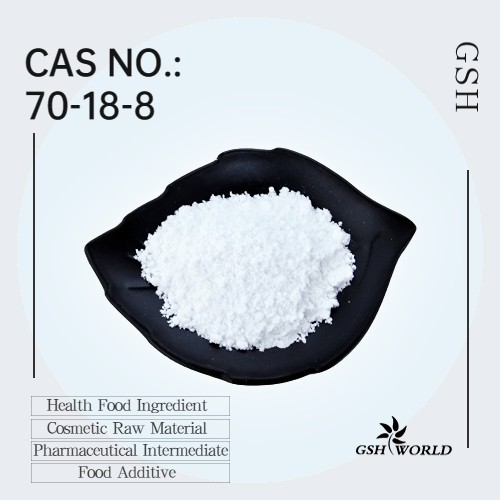How is glutathione raw material produced?
by: GSHWORLD
time: 2023-06-01
classify: Technological Innovation
Glutathione (GSH) is a tripeptide that has many biological and biotechnological functions, such as acting as an antioxidant agent, a detoxifier, and a precursor for pharmaceuticals and food additives. GSH is usually obtained by fermentation using microorganisms, especially Saccharomyces cerevisiae, which can synthesize GSH from its three amino acid precursors: L-glutamate, L-cysteine, and glycine. However, the production of GSH by S. cerevisiae is influenced by several factors, such as the medium composition, the environmental conditions, and the genetic engineering of the yeast strain. In this article, we will review some of the recent advances and challenges in the biotechnological production of GSH by S. cerevisiae.

One of the main factors that affects GSH production by S. cerevisiae is the availability of amino acids in the medium. L-cysteine is the limiting amino acid for GSH synthesis, as it contains the thiol group that confers the antioxidant properties to GSH. Therefore, supplementing the medium with L-cysteine or its precursors, such as L-methionine or L-serine, can increase the intracellular GSH content of S. cerevisiae. However, excess L-cysteine can also inhibit GSH synthesis by feedback inhibition or cause toxicity to the yeast cells. Therefore, optimizing the concentration and timing of amino acid addition is crucial for maximizing GSH production.
Another factor that influences GSH production by S. cerevisiae is the environmental condition of the fermentation process. GSH synthesis is regulated by the redox status of the yeast cells, which depends on the oxygen availability, pH, temperature, osmotic pressure, and magnetic field. Generally, aerobic conditions favor GSH production, as oxygen is required for the oxidation of NADPH to NADP+, which provides the reducing power for GSH synthesis. However, too much oxygen can also generate reactive oxygen species (ROS) that can damage the yeast cells and consume GSH. Therefore, controlling the dissolved oxygen level in the fermentation broth is important for maintaining a balance between GSH synthesis and consumption. Similarly, other environmental factors can also affect GSH production by modulating the redox status and metabolic activity of S. cerevisiae.
A third factor that can enhance GSH production by S. cerevisiae is the genetic engineering of the yeast strain. Several genes involved in GSH synthesis and transport have been identified and manipulated to increase GSH production by S. cerevisiae. For example, overexpressing genes encoding key enzymes for GSH synthesis (GSH and GSH), increasing the copy number of genes encoding transporters for amino acids (GAP1) or GSH (OPT1), or deleting genes encoding enzymes for GSH degradation (DUG and DUG) can improve GSH yield and productivity. Moreover, metabolic engineering strategies can also be applied to redirect carbon flux towards GSH synthesis or reduce ROS generation.
In conclusion, GSH production by S. cerevisiae is a complex process that depends on multiple factors. By optimizing these factors through technological and genetic approaches, it is possible to improve GSH production and meet the increasing demand for this valuable compound in various industries.

by GSHWORLD
GSHWORLD is China Biological API Manufacturer. China Glutathione Supplements powder suppliers & best Glutathione benefits raw material Factory.









